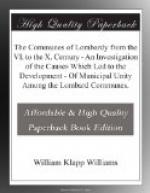municipium, which we have learnt to consider
as overthrown, from a constitutional standpoint as
annihilated; but that the new principle introduced
into state life by the northern conquerors of Italy,
the principle of administration by county rather than
by urban divisions, relegated the city to an inferior
place as part of a rural holding, instead of leaving
it the centre of a circle of rural dependencies.
Having demonstrated the absence of all constitutional
recognition of the municipal unit as such, I have attempted
to show how a condition of such legal insignificance
became generally a condition of actual importance;
how from a position of such negative interest, the
advance of the city was commenced along a road which
was ultimately to restore it its old pre-eminence,
even adding to this in time the almost forgotten attribute
of sovereignty. The motives for this advance
we have seen to be no higher ones than convenience
and expediency, which made the urbs of every
civitas the natural centre of its local administration,
thereby in fact, if in no way by law, restoring to
it some of the elements of individuality, if not of
pre-eminence, which it had lost. The means employed
we have seen to be the functions of the various officers
of state: the dux, the count and the gastald,
who connected the city with the state, and the scabinus
and the bishop, who represented this connection to
the consciousness of the people. We have noted
the marked effects produced on the development of
a more popular feeling, by the changes introduced
by the great emperor of the Franks; which, by diminishing
the power of the local lords, accomplished a double
benefit; on the one hand by saving the people from
the arbitrary rule of a feudal superior; on the other,
by causing the city to become more of a dependence
and more of a support to the state as a whole.
And finally we have left the city prepared, on the
return of another dynasty of native kings, to accept,
at least in a large number of cases, the domination
of another kind of lord, a spiritual one; who was to
serve as a medium for breaking up the power of the
old lords of the civitas, and from whom it
would be an easier task for the commune of the future
to wrest the power and the sovereignty which was to
make it a free and independent autonomy.
* * * * *
AUTHORITIES REFERRED TO IN THE TEXT AND FOOT-NOTES.
Anastasius Bibliothecarius: Vitae Romanorum Pontificum. v. Muratori: Script. Rer. Ital., Tom. III., Pars I.
Baluzii, Stephanus: Capitular. Regum Francorum additae sunt Marculfi Monachi et aliorum formulae veteres. Parisiis, 1780. 2 vols. fol.
Bethmann-Hollweg: Schrift ueber den Ursprung der lombardischen Staedtefreiheit.
Bouquet, Martin: Recueil des historiens des Gaules et de la France, etc. Paris, 1738-1855. 21 vols. fol.




